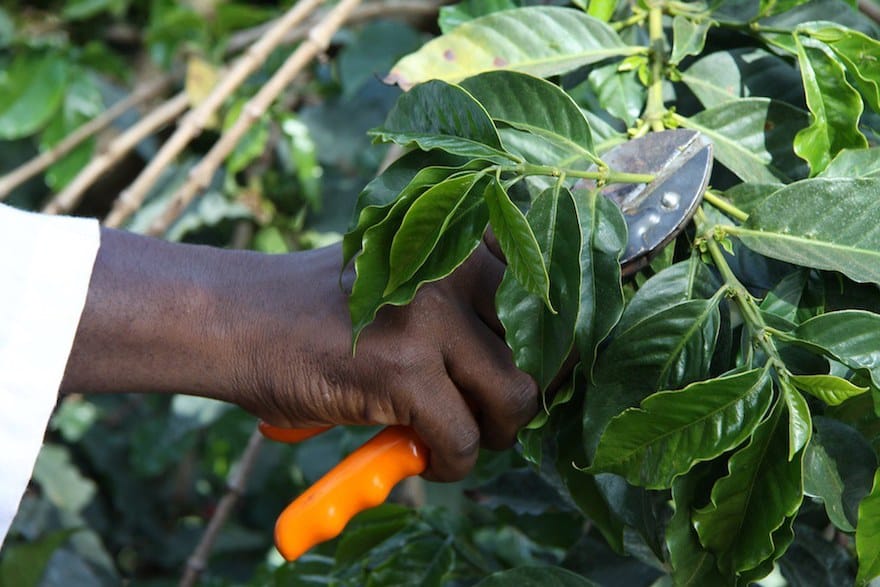Just so you know, as an Amazon Associate we earn from qualifying purchases made via bold red links, buttons or images.
Last Updated on December 15, 2023
The main difference between organic and non-organic coffee is that organic coffee is grown and processed without the use of any chemical pesticides, herbicides, synthetic fertilizers or other additives that might be used in farming non-organic coffee. The National Organic Program created by Congress in 2001 develops and enforces these national standards.
When you choose to drink organic vs. non-organic coffee, the benefits are felt primarily by:
- your health
- the environment
- the farmers who grow your coffee
Your health benefits because the coffee is free of the damaging chemicals contained in many pesticides, herbicides, fungicides and fertilizers used in farming.
The environment benefits because when those chemicals aren’t used in farming, they don’t get into the soil, air and water.
And the coffee-producing farmers benefit because they aren’t exposed to those toxins as they tend to their coffea plants.
Coffee is well known for containing antioxidants that prevent cells from oxidizing and releasing harmful “free radicals” into our system. These unstable atoms can damage other cells and are believed to accelerate aging. Coffee’s antioxidants keep them at bay.
With organic coffee, you still get all those antioxidants—your body just doesn’t have to deal with the bad stuff that can find its way into non-organic coffee through the use of agricultural chemicals.
What makes coffee organic?
To be organic, coffee must be grown on a farm that hasn’t used any chemical farming practices for three years. The U.S. Congress created the National Organic Program (NOP) in 2001 to develop and enforce national standards for all organic agricultural products worldwide that are sold in the U.S.
The NOP regulatory program helps train agricultural inspectors who certify that farms and businesses meet and comply with national organic standards. They develop all the production, handling, labeling and enforcement regulations of U.S. Department of Agriculture organic products.
Because certified organic coffee is a single-ingredient food, it will have the USDA Organic label. If a product contains other ingredients besides organic coffee, it will not have the official USDA label. Instead, the labeling may read:
- Organic: It is 95% to 99% organic.
- Made with Organic Ingredients: The product is 70% to 94% organic.
- If the package contains some organic ingredients, it may name and identify the specific ingredients as organic.
Small farms that sell less than $5,000 worth of coffee each year are exempt from the certification program and can still claim to be organic. UTZ Certified coffee and Rainforest Alliance Certified coffee come from farms that have met certain sustainable standards and are commonly considered organic. Those farms are closely monitored.

Is organic coffee healthier?
In 2015, Consumer Reports found that 85% of people had concerns about pesticides in food. The same publication reported that choosing organic is always the healthiest choice.
Natural antioxidants in coffee may stabilize and reduce oxidative stress or free radical damage and inflammation in your body. According to the International Journal of Advanced Research, oxidative stress is instrumental in aging. News Medical reports that oxidative stress may contribute to diabetes, heart disease, high blood pressure, hardening of the arteries, cancer, chronic fatigue syndrome and neuromuscular diseases.
The academic journal Molecules showed evidence in 2016 that coffee increases glutathione levels and reduces DNA damage. Glutathione is an antioxidant that helps reduce oxidative stress and free radical damage.
We know toxic chemical residues from pesticides contribute to many diseases such as cancer, diabetes, Parkinson’s disease, birth defects, developmental and learning disabilities, Alzheimer’s disease and asthma. For your health, the choice between organic vs. non-organic coffee is clear: organic is healthier.
Other organic coffee benefits
The use of pesticides in agriculture poses a significant risk to human health, according to a 2009 article by the National Institutes of Health. They reported that we have contaminated almost all of our environment, leaving chemical residues in the soil, air and water. The best way to support the environment, they said, is for everyone to use safer non-chemical agricultural methods.

Farm workers face increased risk of chronic diseases that have been linked to pesticides, according to the Pesticide Action Network of North America. These include birth defects, cancer and learning disabilities.
Organic coffee does not contain harmful chemicals that put the health of farm workers at risk. No chemicals leach into the soil, the drinking water or the air.
And if you really want to spend your coffee dollar in a way that benefits the farmers who produce it, look into fair trade coffee as well.
Is organic coffee worth it?
Estimates say that about 83% of American adults drink coffee. That’s a huge sector of people whose health could be affected by non-organic coffee. Organic may cost a little more, but if you consider the possible cost savings in healthcare and reduced environmental contamination by switching to organic, the benefits seem to outweigh the cost. Short-term savings could result in significantly higher costs at a later date.
You can save 10-15% on the price of organic coffee by getting an organic coffee subscription. If you purchase one bag a week with a 15% savings off the price of $14.99, you would save $36 a month or $432 a year. Choose a variety pack or stick to your favorite. People love the convenience and reliability as well as the savings.
Should you buy organic coffee?
Enjoy the start of each new day with your favorite top-rated organic coffee that supports your health.
- Decrease your risk of debilitating aging effects
- Decrease your risk of getting cancer, diabetes, neuromuscular diseases, high blood pressure, heart disease, hardening of the arteries and chronic fatigue syndrome
- Contribute to the health and wellbeing of farm workers
- Preserve the soil, air and waters of the earth
For all of the reasons above, Bean Poet prefers organic vs. non-organic coffee.

